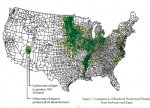Over on Edmunds Inside Line web site, they report monthly on the mpg of their test cars. For March, a 2009 Volkswagen Jetta TDI with 2.0L diesel engine averaged 35.6 mpg, with one tankful recording a best mpg of 43.0 and worst tankful at 28.7 mpg. The EPA rates the Jetta diesel at 34 mpg in combined driving, so Edmunds is doing a little better than the EPA predicted.
For USA nationally, diesel fuel is about 23 cents per gallon (8%) more expensive than regular gas. That difference drops to 15 cents in the Midwest, and only 7 cents more expensive than gas in many parts of the West.
Chip Haven
For USA nationally, diesel fuel is about 23 cents per gallon (8%) more expensive than regular gas. That difference drops to 15 cents in the Midwest, and only 7 cents more expensive than gas in many parts of the West.
Chip Haven

